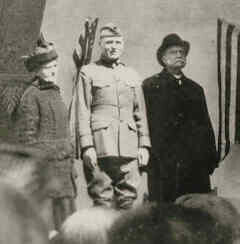News & Articles
Browse all content by date.
 George Seanor Robb standing between his parents in Salina, Kansas, at the awarding of his Congressional Medal of Honor for service to the nation in World War I.
George Seanor Robb standing between his parents in Salina, Kansas, at the awarding of his Congressional Medal of Honor for service to the nation in World War I.
Today Donald Trump awarded the Presidential Medal of Freedom to Miriam Adelson who has donated tens of millions of dollars to his campaigns. ABC News reported Trump saying that, “the Medal of Freedom is ‘much better’ than the Medal of Honor, the nation’s highest military honor, because soldiers are in ‘bad shape’ or dead when they receive it.”
I recently published the following column in a book: “Not your usual Republican.” It seems appropriate to reprint the column today to honor of one of the “losers” who was awarded the MOH while he was in “bad shape.”
Sergeant York Published Jan. 2005
When I was in fifth grade my grandfather made one of his infrequent visits to our house. It was the only time that we watched a movie together. George Robb, my mother’s father, was a man whose example both my parents encouraged me to emulate. Since Grandfather had been given the nation’s highest military award, The Congressional Medal of Honor (MOH), this would prove a challenge.
MOH winners are few and exalted for their “conspicuous gallantry above and beyond the call of duty.” Duluth has one, Mike Colalillo, and the City named West Duluth ’s Colalillo Drive in his honor. My grandfather was always appropriately modest about his MOH. He claimed that he hadn’t done anything more heroic than countless others had done.
When his award was announced shortly after his discharge from a military hospital he told the Army to mail it to him. The garrison near his home in Salina, Kansas, had other ideas. The Salina schools were closed for the award ceremony and Pathé films made a newsreel of the occasion for movie theaters.
I got to thinking about my grandfather’s visit when my wife and I drew up an eclectic list of old movies to watch during the holidays. I put Sergeant York on the list. Years ago, before DVDs and VHS tapes, people watched whatever the three networks had to offer. Coincidentally, Sergeant York was scheduled for broadcast during my grandfather’s rare visits. My mother enthusiastically suggested that he stay and watch it with us and to our surprise he agreed.
My grandfather wasn’t a fan of the movies. Perhaps, during the Depression, he regarded them as an extravagance. On the one occasion that my mother and her sister successfully badgered him to take them to a movie by arguing that General Custer was a historical figure, he returned from the theater unimpressed. He told them Custer should have been court martialed. He had a master’s degree in history and had no truck with Hollywood’s glamorized nonsense.
But Sergeant York was a different movie. For one thing it was a great motion picture. It was filmed in 1941 on the eve of America’s entry into the Second World War. In its own subtle way the movie helped pave the way for a reluctant America to break out of the isolationism and the national disillusionment brought on by the First World War.
In 1941 my grandfather was an isolationist. He was being consistent. In 1916 he had taken the unprecedented step of voting for a Democrat, Woodrow Wilson, because of his promise to keep America out of Europe ’s war. Yet my grandfather also lived by a simple credo “my country right or wrong.” He volunteered immediately for the war he had so vigorously opposed.
My grandfather didn’t watch the movie with us because of its reputation but because of its subject matter, Alvin York. However modest my grandfather was about his own exploits he held the mysterious York in awe. While my grandfather attended many national reunions with other MOH winners he never met the modest and retiring York.
Alvin York had been a reluctant warrior and this is the chief subject of the movie named after him. A Tennessee farm boy, York had applied to be a conscientious objector after being drafted. According to the movie he believed that the Ten Commandments forbade the taking of human life so he fought to stay out of the Army.
During the Vietnam War the Supreme Court would uphold CO status for men like York but during the First World War York’s appeals were rejected. The movie is an earnest attempt to portray his remarkable shift from CO to MOH winner and his single-handed capture of 132 German soldiers. My wife chuckled in disbelief as Gary Cooper, the movie’s star, grimly marched his prisoners to the American lines in a near futile attempt to find someone who could cope with all his POWs. The story is true. It’s in the citations.
My grandfather made no disparaging remarks about York, as he had Custer, after the movie was over. The moral conundrums faced by York never troubled my grandfather. If a war is none of your business - stay out of it. Once someone has made it your business, win it. That was my grandfather’s opinion.
York’s story, Howard Hawks’s movie, and my grandfather’s admiration for York all left a deep impression on me. I carried the memory of Sergeant York into the Vietnam Era. The movie inoculated me against pacifism but it never made me a devotee of “my country right or wrong.” I expect America to be right.
Harry’s book can be ordered at Amazon.com. You can read more about his grandfather at: www.lincolndemocrat.com
| Tweet |


